Natural Gas Engineer Average Salary in Iceland 2024
How much money does a person working as Natural Gas Engineer make in Iceland?

LOW
289,000
ISK AVERAGE
629,000
ISK HIGH
1,000,000
ISK
A person working as Natural Gas Engineer in Iceland typically earns around 629,000 ISK. Salaries range from 289,000 ISK (lowest) to 1,000,000 ISK (highest).
Salary Variance
This is the average salary including housing, transport, and other benefits. Natural Gas Engineer salaries in Iceland vary drastically based on experience, skills, gender, or location. Below you will find a detailed breakdown based on many different criteria.
Natural Gas Engineer Pay Scale and Salaries in Iceland

Salary Structure and Pay Scale Comparison
596,000 ISK or more
523,000 to 596,000 ISK
360,000 ISK or less
360,000 to 523,000 ISK
 289,000 ISK |
 601,000 ISK |
 1,000,000 ISK |
Median Salary, maximum and minimum salary, minimum wage, starting salary, and the salary range
Salary Range, Minimum Wage, and Starting Salary
Salaries for the position Natural Gas Engineer in Iceland range from 289,000 ISK (starting salary) to 1,000,000 ISK (maximum salary). It should be noted that the given figure is not the legally mandated minimum wage; rather, it represents the lowest figure reported in a salary survey that included thousands of participants and professionals from all regions of the country.
Median Salary
With a median salary of 601,000 ISK, half of the professionals who work as Natural Gas Engineer in Iceland earn less than this amount, and the other half earn more. The median salary denotes the middle value of salaries. Ideally, you would want to belong to the group earning more than the median salary, located on the right side of the salary distribution graph.
Percentiles and Salary Scale
The median is closely associated with two other values known as the 25th and 75th percentiles. By examining the salary distribution chart, it can be determined that 25% of professionals employed as Natural Gas Engineer in Iceland earn less than 485,000 ISK, while 75% earn more. Similarly, the chart shows that 75% earn less than 693,000 ISK while 25% earn more.
Pay Scale Structure
To provide a better understanding of expected salaries, we categorized the frequently occurring salaries into different ranges. This approach provides a more precise representation of salary distribution for the job title Natural Gas Engineer in Iceland compared to simply calculating the average. The majority of reported salaries, approximately 65%, fall within the range of 360,000 ISK to 523,000 ISK. About 20% of salaries are below the 360,000 ISK mark, while 10% fall within the range of 523,000 ISK to 596,000 ISK. Only 5% of individuals have salaries exceeding 596,000 ISK.
Salary Comparison by Years of Experience / Natural Gas Engineer / Iceland
How do experience and age affect pay?
| 0 - 2 Years | 328,000 ISK | |
| 2 - 5 Years | +34% | 439,000 ISK |
| 5 - 10 Years | +48% | 648,000 ISK |
| 10 - 15 Years | +22% | 790,000 ISK |
| 15 - 20 Years | +9% | 861,000 ISK |
| 20+ Years | +8% | 932,000 ISK |
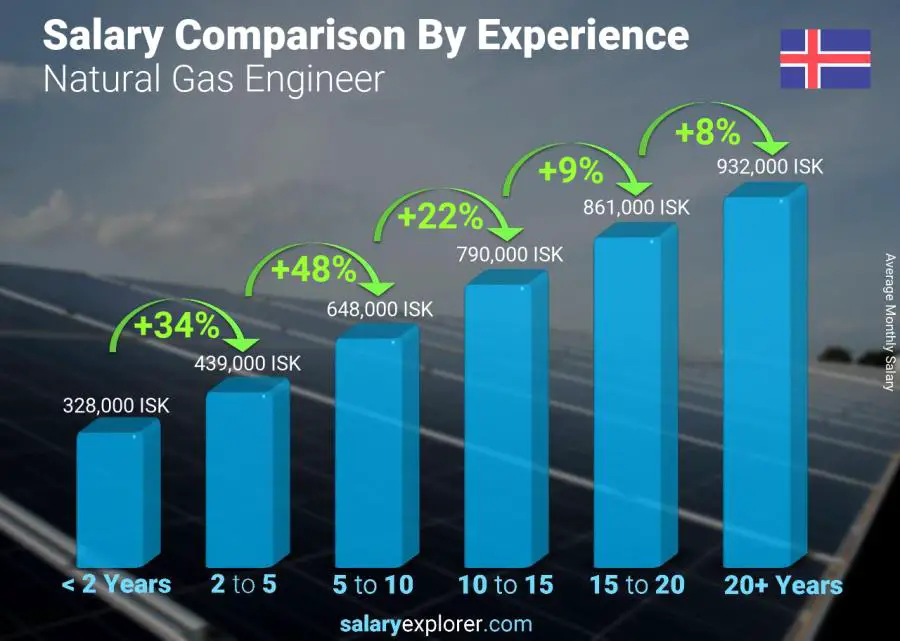
The experience level is the most important factor in determining the salary. Naturally, the more years of experience the higher the wage. We broke down salaries by experience level for people working as Natural Gas Engineer and this is what we found.
Employees with less than two years of experience earn approximately 328,000 ISK.
While someone with an experience level between two and five years is expected to earn 439,000 ISK, 34% more than someone with less than two year's experience.
Moving forward, an experience level between five and ten years lands a salary of 648,000 ISK, 48% more than someone with two to five years of experience.
Additionally, professionals whose expertise span anywhere between ten and fifteen years get a salary equivalent to 790,000 ISK, 22% more than someone with five to ten years of experience.
If the experience level is between fifteen and twenty years, then the expected wage is 861,000 ISK, 9% more than someone with ten to fifteen years of experience.
Lastly, employees with more than twenty years of professional experience get a salary of 932,000 ISK, 8% more than people with fifteen to twenty years of experience.
Typical Salary Progress for Most Careers
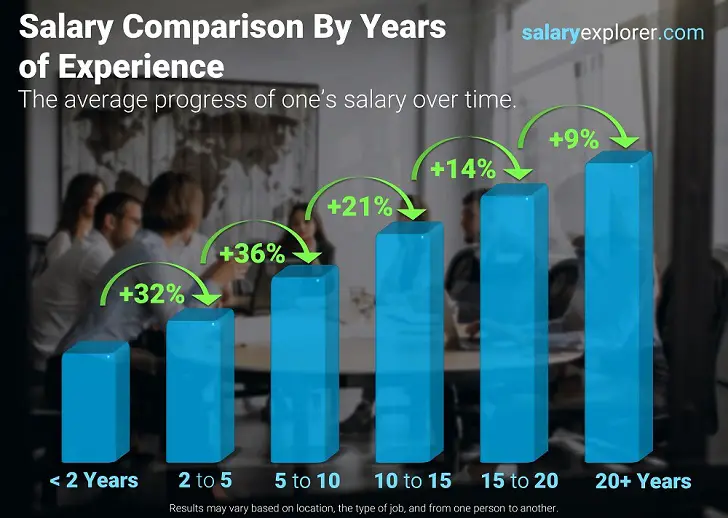
Salary Comparison By Education / Natural Gas Engineer / Iceland
How do education levels affect salaries?
Displayed below is the average salary variance between different education levels of professionals working as Natural Gas Engineer.
| High School | 296,000 ISK | |
| Certificate or Diploma | +24% | 367,000 ISK |
| Bachelor's Degree | +39% | 510,000 ISK |
| Master's Degree | +63% | 829,000 ISK |
| PhD | +20% | 993,000 ISK |

We all know that higher education equals a bigger salary, but how much more money can a degree add to your income? We broke down salaries by education level for the position Natural Gas Engineer in order to make a comparison.
Level 1: High School
Employees at this education level have an average salary of 296,000 ISK.
Level 2: Certificate or Diploma
At this level, the average salary becomes 367,000 ISK, 24% more than the previous level.
Level 3: Bachelor's Degree
At this level, the average salary becomes 510,000 ISK, 39% more than the previous level.
Level 4: Master's Degree
At this level, the average salary becomes 829,000 ISK, 63% more than the previous level.
Level 5: PhD
At this level, the average salary becomes 993,000 ISK, 20% more than the previous level.
Is a Master's degree or an MBA worth it? Should you pursue higher education?
A Master's degree program or any post-graduate program in Iceland costs anywhere from 3,450,000 ISK to 10,300,000 ISK and lasts approximately two years. That is quite an investment.
You can't really expect any salary increases during the study period, assuming you already have a job. In most cases, a salary review is conducted once education is completed and the degree has been attained.
Many people pursue higher education as a tactic to switch to a higher-paying job. The numbers seem to support the theory. The average increase in compensation while changing jobs is approximately 10% more than the customary salary increment.
If you can afford the costs of higher education, the return on investment is definitely worth it. You should be able to recover the costs in roughly a year or so.
Typical Salary Difference by Education for Most Careers

Salary and Compensation Comparison By Gender / Natural Gas Engineer / Iceland

Though gender should not have an effect on pay, in reality, it does. So who gets paid more: men or women? For the people who work as Natural Gas Engineer in Iceland, the average difference between the salary of male and female employees is 5%.
| Male | 643,000 ISK | |
| Female | -4% | 615,000 ISK |
Salary Comparison By Gender in Iceland for all Careers

Average Annual Salary Increment Percentage / Natural Gas Engineer / Iceland
How much are annual salary increments in Iceland for individuals working as Natural Gas Engineer? How often do employees get salary raises?
Individuals working as Natural Gas Engineer in Iceland are likely to observe a salary increase of approximately 8% every 28 months. The national average annual increment for all professions combined is 4% granted to employees every 29 months.
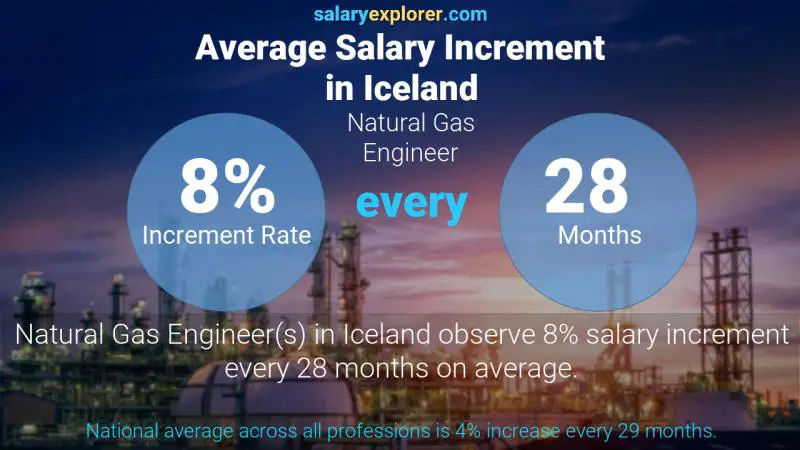
Iceland / All Professions
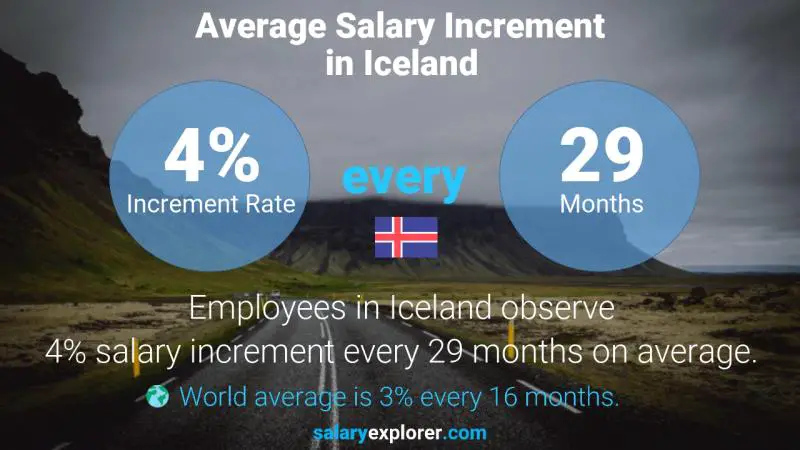
The term Annual Salary Increase usually refers to the increase in 12 calendar month period, but because it is rare that people get their salaries reviewed exactly on the one-year mark, it is more meaningful to know the frequency and the rate at the time of the increase.
How to calculate the salary increment percentage?
The annual salary Increase in a calendar year (12 months) can be easily calculated as follows: Annual Salary Increase = Increase Rate x 12 / Increase Frequency
Worldwide Salary Raises: All Countries and All Jobs
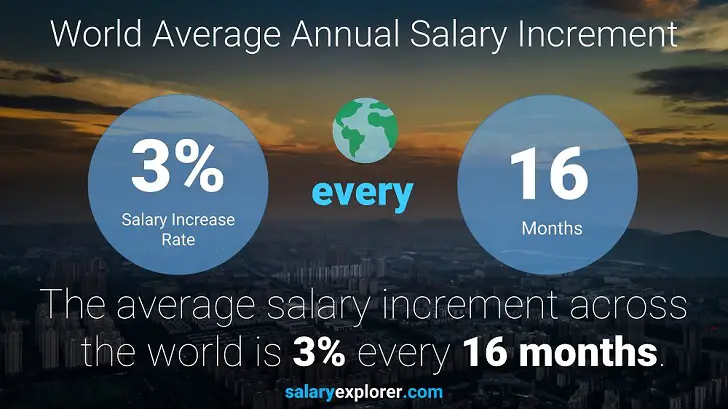
Salary Packages and Schemes
Not all compensation increases are reflected directly in the salary. Some companies offer upgraded packages to their staff instead of cash money. The figures displayed here account only for direct increments to the base salary.
Bonus and Incentive Rates / Natural Gas Engineer / Iceland
How much and how often are bonuses being awarded? Share This Chart Tweet Get Chart Linkhttp://www.salaryexplorer.com/charts/iceland/oil-gas-energy-mining/natural-gas-engineer/annual-salary-bonus-rate-iceland-natural-gas-engineer.jpg
Share This Chart Tweet Get Chart Linkhttp://www.salaryexplorer.com/charts/iceland/oil-gas-energy-mining/natural-gas-engineer/annual-salary-bonus-rate-iceland-natural-gas-engineer.jpg
84% of surveyed staff reported that they haven't received any bonuses or incentives in the previous year while 16% said that they received at least one form of monetary bonus.
Those who got bonuses reported rates ranging from 0% to 4% of their annual salary.
| Received Bonus | 16% | |
| No Bonus | 84% |
Types of Bonuses Considered
Individual Performance-Based BonusesThe most standard form of bonus, where the employee is awarded based on their exceptional performance.
Company Performance BonusesOccasionally, some companies like to celebrate excess earnings and profits with their staff collectively in the form of bonuses that are granted to everyone. The amount of the bonus will probably be different from person to person depending on their role within the organization.
Goal-Based BonusesGranted upon achieving an important goal or milestone.
Holiday / End of Year BonusesThese types of bonuses are given without a reason and usually resemble an appreciation token.
Bonuses Are Not Commissions!
People tend to confuse bonuses with commissions. A commission is a prefixed rate at which someone gets paid for items sold or deals completed while a bonus is in most cases arbitrary and unplanned.
What makes a position worthy of good bonuses and a high salary?
The main two types of jobs | |
| Revenue Generators | Supporting Cast |
Employees that are directly involved in generating revenue or profit for the organization. Their field of expertise usually matches the type of business. | Employees that support and facilitate the work of revenue generators. Their expertise is usually different from that of the core business operations. |
Example: | Example: |
Revenue generators usually get more and higher bonuses, higher salaries, and more frequent salary increments. The reason is quite simple: it is easier to quantify your value to the company in monetary terms when you participate in revenue generation.
Bonus Comparison by Seniority Level
Top management personnel and senior employees naturally exhibit higher bonus rates and frequencies than juniors. This is very predictable due to the inherent responsibilities of being higher in the hierarchy. People in top positions can easily get double or triple bonus rates than employees down the pyramid.
Average Hourly Wage / Natural Gas Engineer / Iceland
 3,630 ISK per hour
3,630 ISK per hourThe average hourly wage (pay per hour) for individuals working as Natural Gas Engineer in Iceland is 3,630 ISK.This is the rate they get paid for every worked hour.
About The Hourly Pay Rate
The hourly wage is the salary paid in one worked hour. Usually, jobs are classified into two categories: salaried jobs and hourly jobs. Salaried jobs pay a fixed amount regardless of the hours worked. Hourly jobs pay per worked hour. To convert salary into hourly wage the above formula is used (assuming 5 working days in a week and 8 working hours per day which is the standard for most jobs). The hourly wage calculation may differ slightly depending on the worked hours per week and the annual vacation allowance. The figures mentioned above are good approximations and are considered to be the standard. One major difference between salaried employees and hourly paid employees is overtime eligibility. Salaried employees are usually exempt from overtime as opposed to hourly paid staff.
What is the minimum hourly rate of pay?
The minimum pay rate per hour for people working as Natural Gas Engineer in Iceland is 1,670 ISK. This is the minimum as per the gathered data in the salary survey not the minimum hourly rate mandated by law.
Salary comparison with similar jobs
| Job Title | Average Salary |
| Oil / Gas / Energy / Mining |  -100% -100% | |
| Assistant Yard Manager | 576,000 ISK |  -8% -8% |
| Associate Analyst | 679,000 ISK |  +8% +8% |
| Associate Landman | 285,000 ISK |  -55% -55% |
| Auxiliary Equipment Operator | 252,000 ISK |  -60% -60% |
| Biomass Plant Technician | 296,000 ISK |  -53% -53% |
| Biomass Power Plant Manager | 847,000 ISK |  +35% +35% |
| Carbon Capture and Storage Specialist | 641,000 ISK |  +2% +2% |
| Chemical Plant Operator | 476,000 ISK |  -24% -24% |
| Chief Contract Compliance Engineer | 616,000 ISK |  -2% -2% |
| Chief Renewable Energy Officer | 1,120,000 ISK |  +78% +78% |
| Chief Sustainability Officer | 1,070,000 ISK |  +70% +70% |
| Completions Engineer | 592,000 ISK |  -6% -6% |
| Cost Controller | 430,000 ISK |  -32% -32% |
| Cost Engineer | 579,000 ISK |  -8% -8% |
| Crude Oil Marketing Representative | 630,000 ISK |  +0% +0% |
| Deep-sea Mining Engineer | 735,000 ISK |  +17% +17% |
| Dispatcher | 258,000 ISK |  -59% -59% |
| Distribution Manager | 848,000 ISK |  +35% +35% |
| Dragline Operator | 276,000 ISK |  -56% -56% |
| Driller Offsider | 211,000 ISK |  -66% -66% |
| Dump Truck Driver | 238,000 ISK |  -62% -62% |
| Electric and Gas Operations Manager | 1,340,000 ISK |  +110% +110% |
| Energy Advisor | 888,000 ISK |  +41% +41% |
| Energy Analyst | 872,000 ISK |  +39% +39% |
| Energy Auditor | 767,000 ISK |  +22% +22% |
| Energy Dispatch Director | 1,010,000 ISK |  +61% +61% |
| Energy Efficiency Auditor | 647,000 ISK |  +3% +3% |
| Energy Efficiency Consultant | 757,000 ISK |  +20% +20% |
| Energy Modeler | 605,000 ISK |  -4% -4% |
| Energy Policy Analyst | 625,000 ISK |  -1% -1% |
| Energy Storage Engineer | 644,000 ISK |  +2% +2% |
| Energy Technical Assistant | 373,000 ISK |  -41% -41% |
| Energy Technical Manager | 732,000 ISK |  +16% +16% |
| Energy Technical Support Manager | 727,000 ISK |  +16% +16% |
| Energy Technical Trainer | 513,000 ISK |  -18% -18% |
| Engineering Geologist | 1,110,000 ISK |  +76% +76% |
| Exploration Manager | 1,020,000 ISK |  +62% +62% |
| Field Safety Auditor | 673,000 ISK |  +7% +7% |
| Fluids Engineer | 590,000 ISK |  -6% -6% |
| Fuel Cell Engineer | 621,000 ISK |  -1% -1% |
| Fuel Cell Technician | 296,000 ISK |  -53% -53% |
| Fuels Handler | 273,000 ISK |  -57% -57% |
| Gas Compressor Operator | 256,000 ISK |  -59% -59% |
| Gas Distribution Plant Operator | 474,000 ISK |  -25% -25% |
| Gas Supply Manager | 889,000 ISK |  +41% +41% |
| Geologist | 1,050,000 ISK |  +67% +67% |
| Geophysicist | 1,140,000 ISK |  +81% +81% |
| Geothermal Engineer | 641,000 ISK |  +2% +2% |
| Geothermal Production Manager | 982,000 ISK |  +56% +56% |
| Geothermal Technician | 402,000 ISK |  -36% -36% |
| HSE Engineer | 576,000 ISK |  -8% -8% |
| HSE Officer | 350,000 ISK |  -44% -44% |
| HSE Supervisor | 419,000 ISK |  -33% -33% |
| HSEQ Administrator | 435,000 ISK |  -31% -31% |
| Hydrogen Fuel Cell Engineer | 681,000 ISK |  +8% +8% |
| Inspector | 572,000 ISK |  -9% -9% |
| Instructor | 509,000 ISK |  -19% -19% |
| Instrument Designer | 480,000 ISK |  -24% -24% |
| Lead Technical Field Advisor | 809,000 ISK |  +29% +29% |
| Lithium Ion Battery Engineer | 564,000 ISK |  -10% -10% |
| Logistics and Tool Coordinator | 525,000 ISK |  -17% -17% |
| Maintenance Engineer | 615,000 ISK |  -2% -2% |
| Maintenance Superintendent | 538,000 ISK |  -14% -14% |
| Material Controller | 386,000 ISK |  -39% -39% |
| Methane Detection and Mitigation Specialist | 558,000 ISK |  -11% -11% |
| Mine Engineer | 565,000 ISK |  -10% -10% |
| Mine Surveyor | 676,000 ISK |  +7% +7% |
| Mining Project Administrator | 551,000 ISK |  -12% -12% |
| Mining Project Assistant | 437,000 ISK |  -31% -31% |
| Mining Project Controls Consultant | 691,000 ISK |  +10% +10% |
| Mining Project Coordinator | 546,000 ISK |  -13% -13% |
| Mining Project Engineer | 596,000 ISK |  -5% -5% |
| Mining Project Manager | 786,000 ISK |  +25% +25% |
| Mining Site Manager | 798,000 ISK |  +27% +27% |
| Mining Team Leader | 641,000 ISK |  +2% +2% |
| Natural Gas Engineer | 629,000 ISK |  +0% +0% |
| NDT Technician | 381,000 ISK |  -39% -39% |
| Net Zero Energy Consultant | 772,000 ISK |  +23% +23% |
| Oil Service Unit Operator | 309,000 ISK |  -51% -51% |
| Oil Trader | 771,000 ISK |  +23% +23% |
| Oilwell Pumper | 219,000 ISK |  -65% -65% |
| Petroleum Engineer | 664,000 ISK |  +6% +6% |
| Petroleum Geologist | 1,050,000 ISK |  +67% +67% |
| Petroleum Pump System Operator | 320,000 ISK |  -49% -49% |
| Petroleum Technician | 344,000 ISK |  -45% -45% |
| Photovoltaic Engineer | 647,000 ISK |  +3% +3% |
| Pipeline Technician | 224,000 ISK |  -64% -64% |
| Power Coordinator | 374,000 ISK |  -41% -41% |
| Power Plant Operations Manager | 1,140,000 ISK |  +81% +81% |
| Power Plant Operator | 463,000 ISK |  -26% -26% |
| Radio Operator | 275,000 ISK |  -56% -56% |
| Reliability Engineer | 603,000 ISK |  -4% -4% |
| Renewable Energy Consultant | 924,000 ISK |  +47% +47% |
| Renewable Energy Engineer | 695,000 ISK |  +11% +11% |
| Renewable Energy Policy Analyst | 714,000 ISK |  +14% +14% |
| Reservoir Engineer | 542,000 ISK |  -14% -14% |
| Risk Analyst | 737,000 ISK |  +17% +17% |
| Roughneck | 612,000 ISK |  -3% -3% |
| Scaffolder | 373,000 ISK |  -41% -41% |
| Shutdown Engineer | 505,000 ISK |  -20% -20% |
| Smart Grid Analyst | 646,000 ISK |  +3% +3% |
| Smart Grid Engineer | 655,000 ISK |  +4% +4% |
| Solar Energy Installation Manager | 853,000 ISK |  +36% +36% |
| Solar Energy Systems Engineer | 600,000 ISK |  -5% -5% |
| Solar Photovoltaic Installer | 378,000 ISK |  -40% -40% |
| Solar Thermal Technician | 359,000 ISK |  -43% -43% |
| Supply Operations Manager | 972,000 ISK |  +55% +55% |
| Sustainability Analyst | 794,000 ISK |  +26% +26% |
| Sustainability Architect | 803,000 ISK |  +28% +28% |
| Sustainability Specialist | 913,000 ISK |  +45% +45% |
| Sustainable Energy Consultant | 824,000 ISK |  +31% +31% |
| System Development Advisor | 705,000 ISK |  +12% +12% |
| Tanker Truck Driver | 225,000 ISK |  -64% -64% |
| Unconventional Oil and Gas Engineer | 623,000 ISK |  -1% -1% |
| Utility Operator | 335,000 ISK |  -47% -47% |
| Waste-to-Energy Specialist | 824,000 ISK |  +31% +31% |
| Wind Energy Project Manager | 843,000 ISK |  +34% +34% |
| Wind Farm Technician | 417,000 ISK |  -34% -34% |
| Wind Turbine Technician | 484,000 ISK |  -23% -23% |
Government vs Private Sector Salary Comparison
Where can you get paid more, working in a private company or the government? The difference between the public or government sector salaries and the private sector salaries in Iceland is 25% on average across all career fields.
| Private Sector | 614,000 ISK | |
| Public Sector | +25% | 765,000 ISK |
Salary Statistics and Calculation Guide
What is considered to be a good and competitive salary for the job title Natural Gas Engineer in Iceland?
A good and competitive compensation would range anywhere between 601,000 ISK and 693,000 ISK. This is a very rough estimate. Experience and education play a very huge part in the final earnings.
Gross Salary (before tax) and Net Salary (after tax)
All salary and compensation figures displayed here are gross salary figures, that is the salary before tax deductions. Because taxes may differ across sectors and locations, it is difficult to accurately calculate the net salary after tax for every career.
Base / Basic Salary
The base salary for a careers like Natural Gas Engineer in Iceland ranges from 289,000 ISK to 485,000 ISK. The base salary depends on many factors including experience and education. It is not easy to provide a figure with very little information, so take this range with a grain of salt.
What is the difference between the median and the average salary?
Both are indicators. If your salary is higher than both the average and the median then you are doing very well. If your salary is lower than both, then many people earn more than you and there is plenty of room for improvement. If your wage is between the average and the median, then things can be a bit complicated. We wrote a guide to explain all about the different scenarios. How to compare your salary




